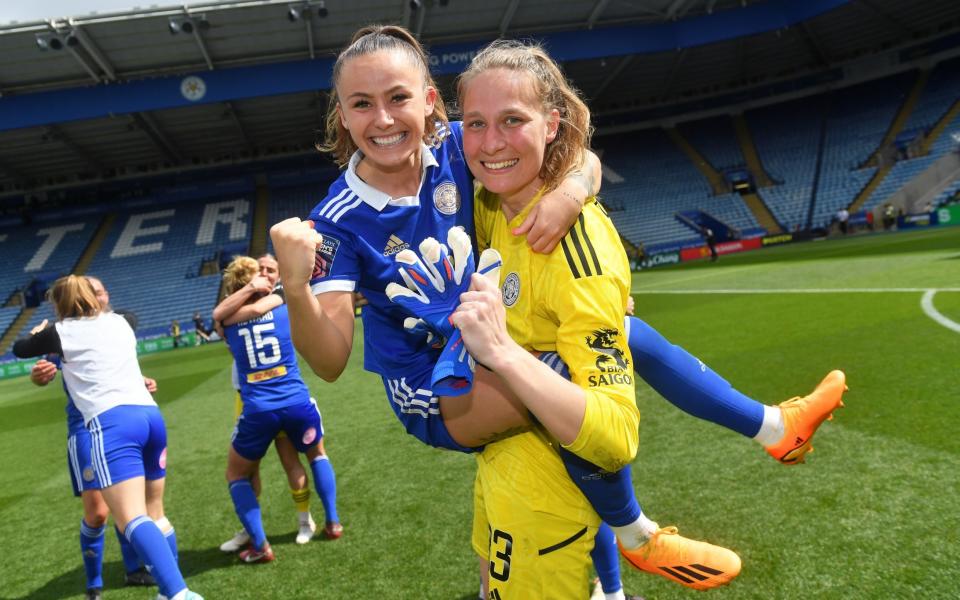Pizzas, points targets and pivotal transfers: The inside story of Leicester City’s great WSL escape

In mid-January, Leicester City were languishing without a single point at the bottom of the Women’s Super League. On Saturday afternoon, they completed the WSL’s greatest escape.
This was not a last-gasp act to avoid relegation on the final day of the season, but the culmination of a six-month turnaround since Willie Kirk replaced Lydia Bedford as manager in November.
After initially seeming to limp towards the WSL’s winter break like a punctured Formula One car trying to make its way back round to the pits, a month-long breather gave the East Midlands club a chance to start from scratch. The club decided to treat the build-up to the second half of the season like pre-season training, returning to Belvoir Drive on December 27 – earlier than many clubs had planned – and the message was simple: ‘We’re hitting reset’.
After calculating a points target that they felt would ensure safety, based on historical WSL data and projections from previous seasons, Kirk met with the club’s board and outlined a strategic plan to achieve that tally across their remaining games. The exact points target has never been disclosed outside of the camp, but it was understood to be in the high teens. Leicester missed their internal target but stayed up nonetheless as Kirk’s staff knew that if they got close to it, they had a fighting chance.
The club took on two behind-closed-doors friendlies during the winter break, and are understood to have beaten an American touring team and West Ham in those secret games. The plan was to build confidence within a team that had scored only two league goals in the first half of the season.
By Wednesday, May 17, with Leicester not yet safe but with destiny in their own hands, Kirk was taking the team out for pizza at Dough What on King Street in the city centre. The atmosphere was relaxed and jovial – a total contrast to the “bleak” mood in camp prior to Christmas.
“They thoroughly deserved it and they thoroughly enjoyed it,” Kirk said of that lunch, joking that it was an “expensive day”. Prior to facing West Ham in their season’s penultimate fixture, he added: “I’m really proud of the work the whole club has done, from the backing I got in January to make the moves I made, to the staff and the players believing in the direction we wanted to take them in, everyone has been on board.”
The January transfer window was pivotal, with Leicester making five signings. The arrival of 19-year-old England youth international Ruby Mace on loan from Manchester City, in particular, has proven to be highly significant. Mace has shown maturity beyond her years in a deep-lying, midfield role as well as also dropping in as a centre-back, and her ball-playing ability has helped transform Leicester’s confidence in possession.
The real masterstroke in that window proved to be the loan signing of German goalkeeper Janina Leitzig from Bayern Munich, whom Kirk has labelled the “best goalkeeper in the WSL”. Leitzig has produced more saves than any other goalkeeper in the WSL, despite not arriving in England until halfway through the campaign. Australia defender Courtney Nevin has also made a strong impact at the back in her 11 league starts since arriving from Hammarby, helping Kirk’s side keep four WSL clean sheets.

The key turning point, however, came with their first victory – and first points – of the league campaign: the 3-0 victory over Brighton & Hove Albion on January 15. Leicester had picked up one point in the previous 11 months, and it was the second campaign in a row where they had lost all of their opening nice WSL fixtures.
“Sometimes you just need one game that shows what you can do,” centre-back Ashleigh Plumptre said earlier this month. “That was one of the most vivid games in my mind this season where you feel like it’s a must-win. There was a lot of optimism.
“When you hit Christmas with no points and everybody looks at it like, ‘Well, they’re down and out’, how can you bring yourself back? We came in at Christmas and we had a plan. We looked long term, at where we wanted to be at the end of the season. We had to have a refresh.
“There was no point thinking about the first half of the season in the second half of the season. A lot of people underestimated us. We’ve all had a collective shift in terms of how we believe we can play and the performances we can put in.”
The second half of Leicester’s season has not been without downsides, including 5-0 and 6-0 losses away at Aston Villa and Chelsea respectively. However, a decisive league double over Liverpool and a last-gasp goal to beat now-relegated Reading 2-1 just before Easter helped their fightback.
Over the summer, Leicester will surely be looking to strengthen the team with more experience. After all, prior to the final day, Leicester had named the youngest starting XIs in the top flight (an average player age of 25 years and 56 days according to Opta) and had used more players (30) than any other side in league games this term, which highlights the need for a more stable XI next term.
Still, hopes will be high. Kirk has taken over a bottom-placed WSL side before – Everton, in 2018 – and led them to a fifth-place finish in 2021. Anything of that magnitude next season would be a huge surprise but, after this turnaround, nobody will write off Kirk’s Leicester.

